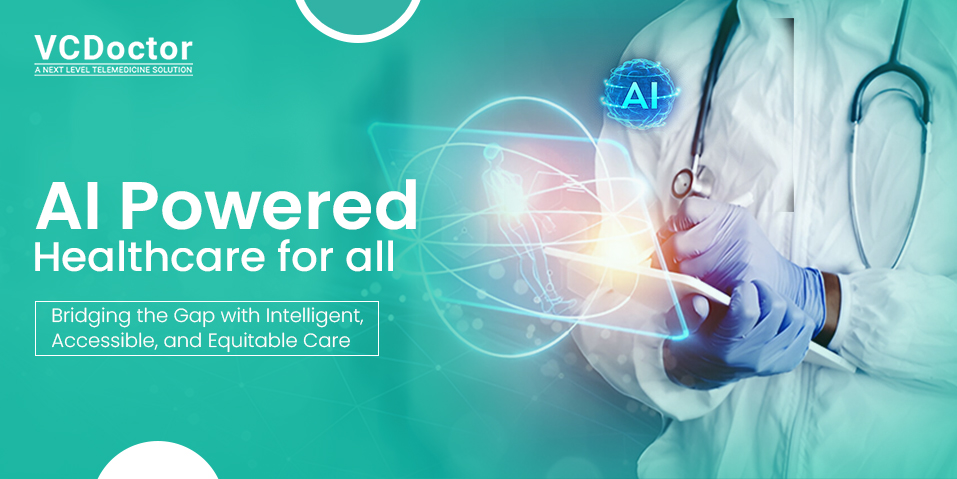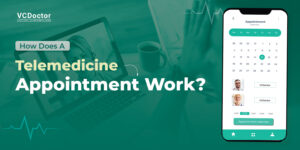AI Powered Healthcare for All: Bridging the Gap with Intelligent, Accessible, and Equitable Care
We live in a highly digitalized world where technologies like artificial intelligence or AI powered healthcare influence every sector. One such industry that has recently witnessed a revolution is the healthcare industry. From answering patients’ queries to providing adequate assistance during surgeries or developing new ways to interact with patients, the effects of AI are everywhere!
The entire AI market is calculated at $11 billion as of 2021. By the end of 2030, this number is expected to grow by $187 billion. This considerable rise reflects upcoming changes in the healthcare sector. If you’re curious about how AI empowers the healthcare industry, bridges the gap with intelligence, and makes healthcare services more accessible, we have got you covered.
This article is a complete guide about the AI powered healthcare industry, how AI improves the healthcare sector, its top benefits, and more. So, without any further ado, let’s dive in!
What Is Artificial Intelligence Technology?
Artificial intelligence, abbreviated as AI, is the ability of a robot or computer to perform easy to complex tasks in the same manner as human beings. In simple terms, “AI combines complex algorithms designed to mimic human intelligence.” Major specifications of artificial intelligence in healthcare include expert systems, natural language processing, speech recognition and machine vision. Artificial intelligence is a man-made technology that simplifies human tasks, allowing machines to learn, read and understand huge chunks of data and make decisions using intellectual thinking.
As the hype around artificial intelligence is boosting, individuals and vendors are trying hard to identify how their products and services can benefit. Generally, AI focuses on certain cognitive skills, including reasoning, self-correction and learning. In today’s time, AI has changed the way we work, play, and live. It is changing how businesses operate as it can automate human tasks, giving them enough free time to make strategies for growth. Since artificial intelligence technology completes tasks more efficiently and error-free, business owners rely highly on this technology.
Introduction Of Artificial Intelligence In Healthcare Industry
Artificial intelligence, or AI, has entered most industries, and healthcare is no exception. AI is known for its unique ability to process data faster, perform error-free repetitive tasks, and complete complex work with maximum accuracy. It is known for filling the space between the latest updates, technological advancements and human expertise. AI in the healthcare industry uses machine-learning software and algorithms to deeply analyze, understand, and decode complex medical and healthcare data.
This technology helps with diagnosis as it can produce accurate treatment plans and overall diagnosis and analyze all available information to track the growing spread of infection or infectious diseases. Above all, AI improves the overall quality of life, ensuring all patients lead healthy lives.
Some major areas in which AI is used prominently in the healthcare sector are diagnosis processes, patient monitoring, drug research, medicine, healthcare analytics, telehealth software and medical robotics. Today, AI is making healthcare operations easier by benefiting staff as well as patients. Thus, it can be said AI in healthcare is here to stay!
Top Ways AI Powered Healthcare Sector Operations
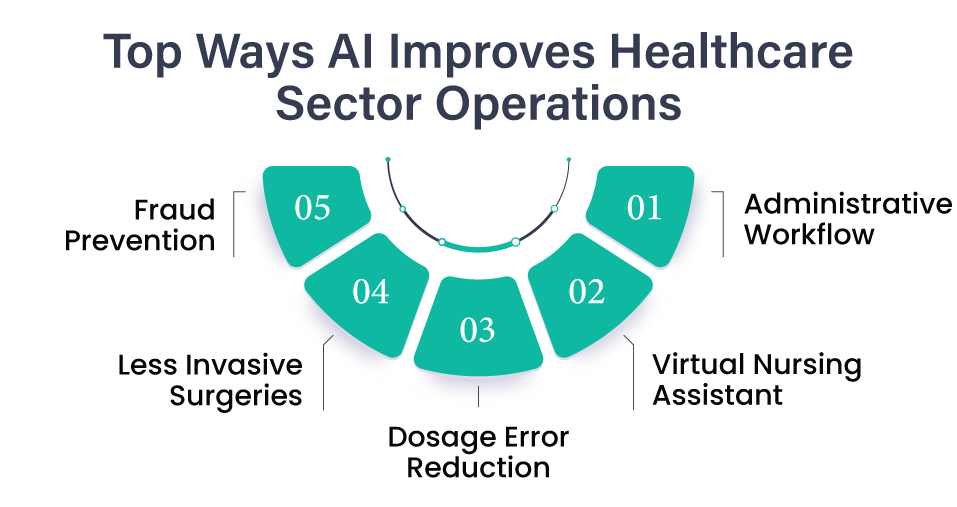
Here are the top ways AI makes the healthcare sector operations more efficient:
1. Administrative Workflow
Most healthcare workers’ time is spent sorting and managing paperwork and other crucial administrative tasks. By introducing AI into the healthcare sector, these tasks can be managed by artificial intelligence in healthcare, allowing healthcare workers to devote their time to other activities. For example, AI can be proven useful in sharing data between different departments and accurate coding.
2. Virtual Nursing Assistant
According to a report, more than 64% of patients find it easy and comforting that AI offers 24/7 support by answering all questions the same as nurses. AI virtual nurse assistants are AI-powered applications, chatbots, or other interfaces that help find answers about medicines, help schedule patient visits, and forward reports to surgeons and doctors. Since AI can handle all these everyday tasks, it frees up nurses, allowing them to focus on patient care only.
3. Dosage Error Reduction
One of the major drawbacks in the healthcare industry is the dosage error. According to a report, more than 70% of the total number of patients taking insulin to control blood sugar levels do not take it as prescribed by their doctors. By using AI-powered applications and tools, such errors can be identified and reduced.
4. Less Invasive Surgeries
There are AI-powered robots that are used by surgeons while performing invasive surgeries to work around sensitive body areas or organs. This minimizes the chances of infection and reduces post-surgery pain and blood loss, making surgeries less invasive.
5. Fraud Prevention
The Healthcare industry has experienced several frauds to date. As per a report, fraud of $380 billion is experienced every year, resulting in the rise of medical bills, out-of-pocket expenses and consumer medical premiums. The introduction of AI into the healthcare industry has significantly reduced the number of frauds as AI carefully analyzes suspicious or unusual patterns in insurance claims like unbundling, not paying medical bills, etc. In such cases, safety measures are taken before the fraud occurs.
Top 8 Benefits Of Incorporating AI Into The Healthcare Sector
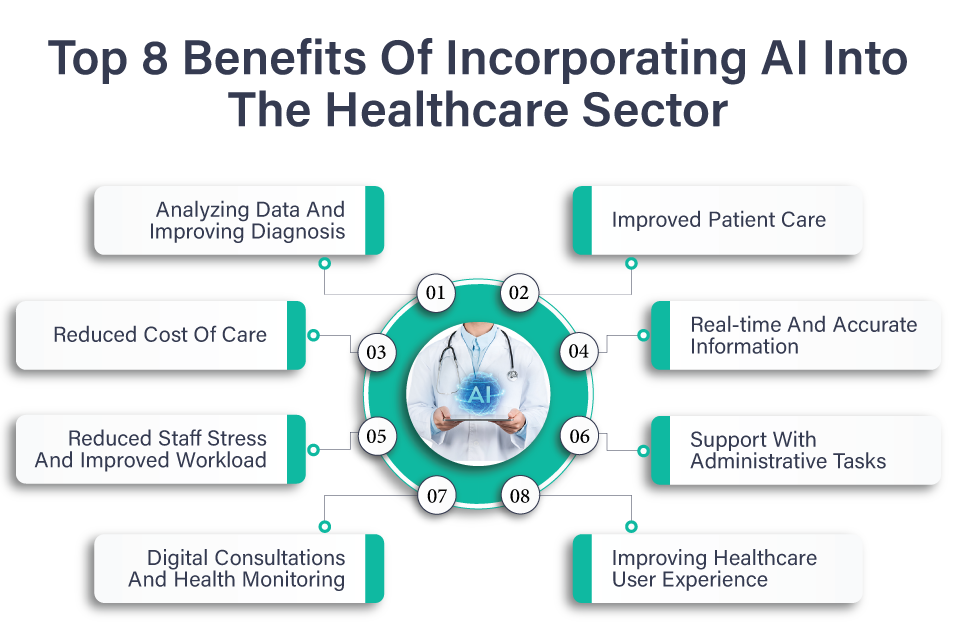
Here are the top benefits of introducing AI into the healthcare sector:
1. Analyzing Data And Improving Diagnosis
The healthcare industry deals with huge amounts of data and information every day. Managing this data is a complex task that can take several days or weeks. All available data can be analyzed easily and more accurately through AI technology, allowing medical professionals to identify the problem and plan the treatment quickly.
2. Improved Patient Care
Artificial intelligence in healthcare industry is known for saving a lot of your crucial time, which can be invested in other major tasks. Since AI helps manage data effectively, cutting down research time, reducing the chances of human error, and promoting improved usage of resources, it leads to better patient care. Integrating AI and medical workflow allows all important decisions to be made effectively.
3. Reduced Cost Of Care
There are a number of ways in which AI health technology reduces the overall cost, both time-wise and financially. Machine learning or ML in the healthcare sector reduces medical errors, eliminates the burden of performing time-consuming tasks, and completes all tasks more efficiently and quickly than humans.
4. Real-time And Accurate Information
In the medical sector, offering patients accurate diagnoses as quickly as possible is extremely important so that further treatment plans can be suggested. Any delay can lead to major health problems and even loss of time. To do so, medical experts must get accurate and relevant data timely without wasting any time, allowing them to make decisions faster. Real-time data minimizes waiting time, reduces overall cost and ensures that the healthcare condition does not worsen.
5. Reduced Staff Stress And Improved Workload
It is a known fact that working in the healthcare sector can be extremely stressful. The introduction of AI into the healthcare industry has significantly reduced staff stress, as there is no need to sit and sort paperwork. Additionally, there are chances of improved functioning because of less human errors.
6. Support With Administrative Tasks
Saving enough time on all administrative tasks ensures all medical experts can drive their focus towards patient care and more vital job areas. Since AI manages all health records, data analysis and scan analysis, it provides adequate support to the administrative functioning.
7. Digital Consultations And Health Monitoring
From wearable technologies to digital consultations, artificial intelligence is an excellent way to improve the way healthcare experts record, analyze and understand all available information, allowing patients to know about their health and analyze it on their own.
8. Improving Healthcare User Experience
More than 83% of people complain about poor communication in the healthcare industry, pointing towards the urge to establish clear and strong communication. AI technologies such as predictive analysis, natural language processing and speech recognition promise effective communication between service providers and patients.
Challenges With Artificial Intelligence In Healthcare
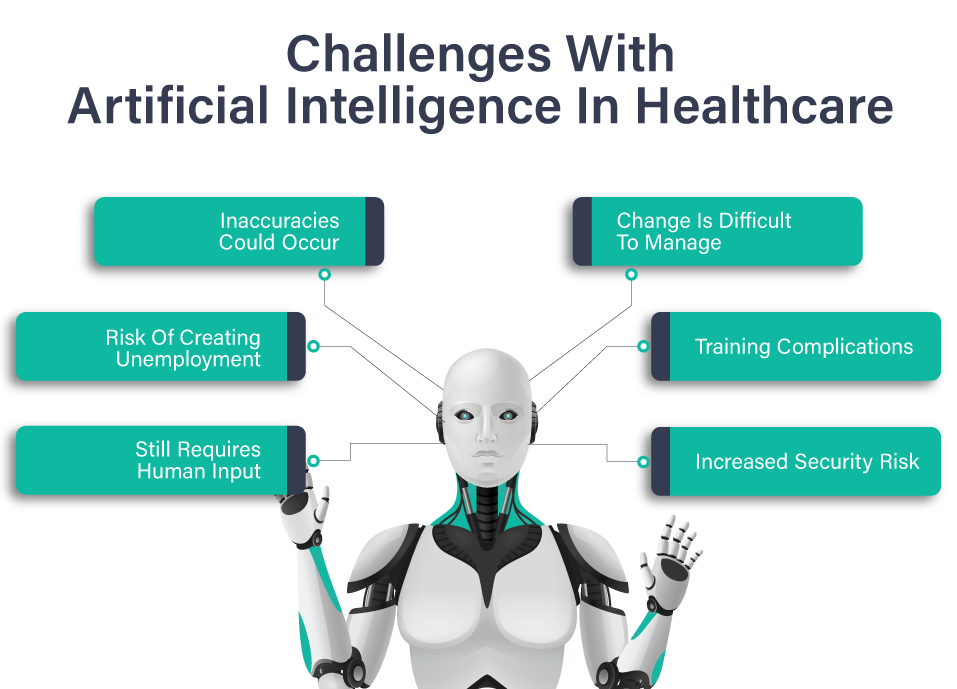
Here are some major challenges with AI health sector:
1. Inaccuracies Could Occur
Although using artificial intelligence technology in the healthcare industry eliminates human-made errors to a great extent, it does not eliminate inaccuracies completely. Since it deals with huge bulks of data and information from various sources, mistakes are inevitable and likely to occur. One major problem is data gaps, leading to several complications in areas such as medical prescription.
2. Change Is Difficult To Manage
No matter the industry, a massive change is difficult to handle and can be highly disruptive. Thus, striking a perfect balance is important. It is important to ensure that the medical sector or department is all set to welcome AI; else, it may lead to a huge problem. Since decisions in the medical industry can take away lives, they are crucial in this industry specifically. All staff must understand the workings of AI so that the technology can be used fastly and efficiently.
3. Risk Of Creating Unemployment
The risk of unemployment due to artificial intelligence is quite evident in not just the healthcare sector but most industries in the world. After the invention of chatbots, there is no longer a need for humans to manage everyday tasks. Since AI takes over all administrative and repetitive tasks, it can largely lead to unemployment.
4. Training Complications
Understanding the functioning of AI requires extensive training; otherwise, it may lead to several complications that are hard to manage, resulting in major complications.
5. Still Requires Human Input
One primary application of AI technology is replacing humans; however, AI powered healthcare industry still requires human input from time to time. Humans can identify and notice changes in a patient’s behavior in a way that no machine or robot can. These observations are important for understanding the underlying medical problem, finding solutions and preventing complications.
6. Increased Security Risk
Another major challenge brought up by AI powered healthcare industry is increased security risk. Since the health industry deals with patients’ personal and confidential information, the chances of breaching always exist. As a result, cyber-attacks are becoming more common and prominent. This triggers the industry to make huge investments to protect patient data.
The Future Of AI In The Healthcare Industry
Although there are several advantages and disadvantages of the AI powered healthcare industry, it is often seen that AI is the future of the healthcare sector as it continues to develop and will be used widely in the upcoming years. Thus, it is estimated to grow by $187 billion by the end of 2030.
From diagnosing a patient’s health to making personalized treatment plans and more, this imagination of the healthcare industry with artificial intelligence is booming like never before. In fact, AI has already established itself in the healthcare industry as it helps manage data and information and conduct in-depth analysis. Above all, the primary aim of the AI powered healthcare industry is to eliminate any chances of human errors or mistakes, make lives easier, extract results quickly, and ultimately improve the way care is delivered at your doors.
No matter whether you are a patient, a medical expert, a nurse, a pharmacist or anyone belonging to the medical sector, the future of AI in the medical industry seems extremely promising. However, regular improvements and updates are vital for betterment.
Frequently Asked Questions (FAQs)
1. What is the major objective of AI in the healthcare industry?
Artificial intelligence or AI technology in the healthcare industry has several major objectives. These include:
- Increasing the overall effectiveness of the diagnostic process
- Reducing the AI powered healthcare costs
- Safe and effective surgeries
- Ease in sharing information and data
2. What is telemedicine? What is the role of AI in telemedicine?
Telemedicine is an online platform where people from the medical industry and patients can communicate easily. They can share problems and formulate a personalized treatment plan for betterment. Because this app uses electronic technology, you can exchange information. Using this, you can book an appointment online by checking your doctor’s schedule. You can chat virtually and get solutions using a desktop or phone. AI remotely monitors a patient’s health condition using sensors and wearable devices.
3. List some challenges of artificial intelligence in telemedicine
Some major challenges experienced by AI in the telemedicine industry include the high cost of customizable solutions, ethical concerns, challenges related to data privacy of ready-made solutions and more. Above all, finding and retaining skilled experts who understand AI technology is difficult.
4. List some potential benefits of the introduction of AI in the healthcare industry
Some major benefits of introducing artificial intelligence into the healthcare industry are:
- Helps in reducing human-made errors
- Offers complete assistance to healthcare experts and medical staff
- Provides 24/7 services to patients
- Promotes error-free and efficient working
- Minimizes the stress levels by giving a helping hand
- Reduced cost of medical
- Promotes accurate and real time data analysis
5. List AI in medicine impact factors
There are several prominent ways in which artificial intelligence technology is impacting the healthcare industry. These include:
- Detecting patients’ diseases faster and promoting faster patient care
- AI promotes accurate and error-free diagnoses of underlying medical problems
- AI automates the drug discovery process
- AI handles all repetitive tasks like updating patients’ records, billing and authorization.
These are some ways in which AI is impacting the healthcare industry and bringing change.
Looking for a Fully-Featured Telemedicine Software?
Wrapping Up
Like most sectors, AI has evolved as a powerful technology and tool in the healthcare industry as well as minimizing the space between all technological advantages and human experience and expertise. AI is Known for its ability to process information faster, deliver end-to-end solutions, make accurate diagnoses, and more; it is revolutionizing the medical industry like never before.
AI is known for its wide range of advantages and disadvantages like transparency, data availability, ethical considerations and more. However, the latest updates and moderations are made to minimize these disadvantages and strike a perfect balance to avail the best possible solutions, ultimately resulting in an efficient healthcare system and solutions.
In this article, we discussed AI powered healthcare for all. We also discussed how AI is bridging the gap and empowering the healthcare industry as a whole. If you’re planning to incorporate AI into your healthcare clinics, offices or centers, get in touch with VCDoctor for excellent solutions!

